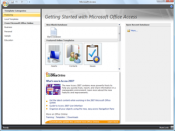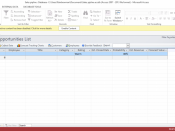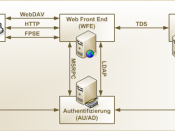As businesses grow so do the amount of information that not only needs to be stored but recalled, and arraigned in a manner that will make it useful. The use of various data base softwareÃÂs has come to fill these needs. Many data base management programs are designed with a specific use in mind, for example, a dental practice may use the database management system called DentDoft, were as a staffing company such as Spherion has designed their own database management system called RecruiterWorkbench. Microsoft Access although not perfect provides many small businesses with an affordable and relatively easy to use solution.
Data in itself is worth very little, data becomes information when it can be managed and manipulated to aid in the decision making process. Simple lists can be made and stored using a word processor, but work processing documents cannot be easily stored or analyzed. More structured information can be kept in spreadsheets.
Sorting, grouping, and selecting information is easy using current versions of Lotus, Microsoft Excel, or Quattro Pro, but linking related information can be clumsy. When using spreadsheets it is also difficult to get subtotals and grand totals without knowing the number of fields containing information in advance. A relational database management system such as Microsoft Access allows data to be segmented into fields or tables of linked data, allowing the relationships between data to be defined and allows data to be easily entered, analyzed, and reported(Socka, 1994).
One of Microsoft AccessÃÂs advantages is that Access can be used to create business application programs that look familiar to users of Microsoft Windows (Socka, 1994). The usersÃÂ familiarity along with Access 2007ÃÂs Office Fluent user interface (UI) allows users to start tracking information, creating reports, and making more informed decisions even with now database experience (Microsoft, 2007).


